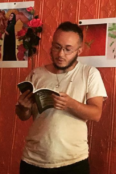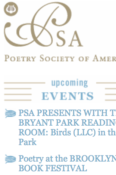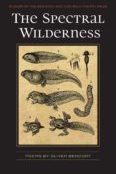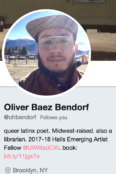“Queerness is plain as the sea; it only gets politicized as being unnatural.”
OLIVER BAEZ BENDORF
Interviewed By: Kaveh Akbar
You're doing this cool cross-country adventure project. Do you want to talk a little bit about it?
Yeah, sure! It's funny—I think of myself as a pretty hardcore homebody.
Me, too. Which is why what you're doing terrifies me.
Haha. What I'm doing is in some ways the scariest possible thing I can imagine, and simultaneously the only thing I can imagine right now. I'm trying to lean hard into roots, and grace, and home. And all of that feels activated right now in a way that's exciting. What is the bare minimum I need with me on the road for it to feel like home? I’ve been traveling with a moon cactus, which by the way is two cacti grafted together, which feels very queer to me. But wow, I can't tell you how many guest rooms and motels I've stayed in during the last month and a half. I lost track, actually. I was trying to count for a while. So, I put all my stuff in storage in Baltimore and then I drove across the country—from Western Massachusetts, across the Midwest, through whiteout in Wyoming—I saw a great waterfall in Idaho. And I've been in the Pacific Northwest for a week and a half. And two days ago I found and bought a total junker of a 1961 camper that I'm going to be fixing up and driving back across the country. I've got a reading and workshop at the University of Wisconsin-Madison at the end of this month, and in my mind it seems like a long time from now, but I mean, my camper doesn't have a front door. And the date is getting closer. I keep telling myself that it's all going to work out somehow.
I'm sure it will.
Thanks.
Do you want to talk a little bit about what you're doing in each city and what your travels entail?
Yeah, I'm going to figure it out as I go along. I've been trying not to predetermine it. And now that I have a camper that's pretty much going to be gutted, I've been thinking about how to make it a multipurpose space. It'll be my home and I'd also like to have people come in for readings. How many people can I fit inside it for a reading? Not very many, but nothing’s wrong with very small readings. I’d like to put up an awning and pull out a table and have a sandwich board sign and just kind of invite people into the space in impromptu ways as I'm traveling. I've been taking inspiration from food trucks that are built out of these campers. A food truck, but for poetry, and also one that I will live in. It’s in progress. I've been calling it Poetry Wagon. I spent a month at Vermont Studio Center, that's where I really sank my teeth into this new book of poems I'm working on, and I wondered, "What does this year look like in order for me to finish this book?" And I somehow arrived at: "Put everything in storage, get a camper, and travel around." I did not account for falling in love, though that happened; that special human joined me and it turns out we travel well together. I just had this desire to be out in the world. Following rivers—which is a big theme in the book I'm working on. And after the election, I just really wanted to travel and see people who I love and who live all over. I haven't totally pieced together what it will feel like to be traveling around in a camper as a queer and trans person, but I'm interested in that, too. Queer was here. We belong.
Totally, totally. I'm certainly reckoning with this question of like, "How do I change my practice in a post November 9th world?" You know what I mean? Because you can't act like that didn't happen. I'm sort of reckoning with what it means to be the poet that I am in this world. And I've talked to a lot of poets who are reckoning with the same thing, but I love how the manifestation of your reckoning has been very sort of egalitarian, like, "Here is a Poetry Wagon. I'm going to take it across the country and I'm going to bring the thing I love the most to the people that I love the most." I'm getting goose bumps talking about this right now. It seems very much in keeping with the spirit of what it means to be a poet.
Yeah, thanks! I'm trying to tap into how to both be present in this political reality that we live in, and also to keep alive and nurture that which makes me feel that life is worth living. This world and the next. I was at Vermont Studio Center right after the election, and during the Ghost Ship fire in Oakland. All these things converged.
Also, I met someone who I really just wanted to figure out how to keep spending time with and move through the world with. It's not very planned. I have a couple of events as anchoring dates, but I want to be able to follow tributaries that seem interesting or urgent somehow, and play in that space of uncertainty, and enjoy parallel play alongside the artist. So, yeah I'm excited. It's a beautiful, weird, old camper, and I've got my work cut out for me.
Haha. Sure, sure. You've sort of built a poetic career—whatever, that kind of sounds gross.
Haha! No, no, tell me about my "poetic career."
Hah. Well, you've built a life in poetry by taking poetry to these places where it's not often taken. You're one of the best-known poetry comic makers, and I think that that's tethered to the same spirit of like, "What medium is best for my creativity?"
Totally, poetry where you least expect it.
Yeah, that's exactly what I'm trying to say.
Yes. That's something that interests me a lot.
Yeah, and I feel like the camper is in the same spirit. You talk about popping it up like a taco truck, and it's just a way of presenting poetry in places where people aren't necessarily looking for it. It's not a book in the back corner of a bookstore. It's not in the predictable place that we expect poetry to live.
I like flyering—like putting up posters—which is something I did a lot with the Mount Pleasant Poetry Project, but I also do it for fun. I like it when I'm walking around and I see a flyer that is not trying to sell me something. There's something about poetry where you least expect it that feels related to how to not just survive the current political climate, but to—I've been trying to think of a word that I hate less than "thrive." I'm still searching for a better word to describe going beyond surviving.
Knowing that there is still the capacity to be surprised by the world, by humans. I'm interested in creating and exploring the conditions of surprise, and playing with interactivity and public poetry in this way that gives people reasons to look up and find the light, or weirdness, or connection. You know, magic. I believe in it.
Me, too. This seems to be related to the project of your first book, The Spectral Wilderness, where you're charting the cartography and ecology of a land as it changes and you're charting the cartography and ecology of a body as it changes simultaneously. And now, as this world we live in and our perceptions of the political climate are changing, it sounds like you're trying to chart that cartography and changing ecology, too. Does that make sense?
Totally. I'm always interested in this question—which I first heard Elizabeth Bradfield articulate in an interview. She’s talking about why she decided to put a series of ‘butch poems’ in a book —Interpretive Work— that is otherwise about being a nature interpreter. And Bradfield so succinctly described the connection, in a way that has really resonated with my work, which is that it's all tied in to this question of "What is natural and who decides?" Queerness as plain as the sea; it only gets politicized as being unnatural. Nature itself, which we are part of, is wild and strange and full of its own ideas about the shapes and forms that things take. So that definitely feels related to The Spectral Wilderness. One of the questions throughout The Spectral Wilderness is "How much aloneness is required for transformation?" Must we go it alone?
Oh, interesting. That's a good way to articulate that.
And the working title of my current manuscript is Togetherness Dreams. So it's a departure from that place of aloneness. I’m learning just how much transformation takes place in the spaces between each other; it’s relational. The desire to be seen. My next book mostly takes place on and around a river, which is a literal river, and also every river, our interconnectedness and how to keep that from drying up. River as grief we float down, river as canary for climate change. Borders, state lines, red states, blue states—rivers laugh in the face of that. What happens upstream happens downstream, too. After the election, I would stare at the Gihon River at VSC every day and I began to imagine a river where everyone I know and love can go to be free and be seen and also, of course, have the health care we all deserve. When I drive around this enormous country, I want to follow rivers.
It's fascinating to hear you talk about the rivers as a foundational metaphor upon which you're building this book because I feel like bodies of water were important in The Spectral Wilderness, too. Like, how a disappeared body of water could become a metaphor for the disappearing body, like when you write, "The land where I was born was born an ocean, and that ocean born / of ice." We don't choose our obsessions, and it seems like bodies of water are central for you.
Totally, and I’m not even a water sign. Air, earth, earth—roots, for sure. And constellations. I think there will be visual diagrams of new constellations woven throughout this next manuscript. A Ghost Ship one for sure. Constellations are togetherness dreams to me-- they stitch together, through story and picture, what are otherwise just isolated bits of light.
Right. That's beautiful. It's cool to hear you talk about the water and the earth and the stars because I feel like your relationship to the natural world is at this sort of compositional level. I'm thinking of your poem, "Patrón," and the lines, "Fish learn / from the water / to be fish / and it's wind that teaches birds / to be themselves. // For Patrón that leaves / fire or maybe earth / hasn't decided yet."
I forgot I wrote that. Thanks for reminding me.
It's totally this process of figuring out which elements to align yourself with and how that relates to personhood. I'm fascinated by that.
Yeah. When writing about nature, it's easy to conflate it to this rural, pastoral landscape. A bucolic silence. Nature is actually very noisy. I can still hear in my head the coyotes howling at night in Iowa. It’s a matter of what kind of noise you prefer. One thing I’m chewing on these days is this notion of safety and how relative that is between urban and rural. I grew up in Iowa and I feel like in some ways I'm always trying to get back to a place where I feel more immersed in nature. And at the same time, I've lived in D.C. for a handful of years and there are definitely aspects about being in that environment that are—you know, safety bends back and forth depending on who you are and what you're used to. There is an LGBT health clinic there and I can often be in a room full of mostly people of color. I have a friend who grew up in the city, and the scariest thing that she can imagine is a dark street with no one else on it. And her partner, who grew up in the country, said the scariest thing that she can imagine is a street with someone else walking on it. Cities have been talked about politically recently as these sort of bastions of hellfire, and decay, and just everything bad you can imagine. But it's actually a lot of people living in close proximity. Safety is in the city. Safety is in the country. Safety is all over. And so is danger. When I got to VSC, it was hunting season and they told us all to wear blaze orange if we went for a walk or a hike. And everyone just looked around at everyone else in black clothes, mismatched blacks, you know. Here we all are in a new place wondering whether we’re going to get mistaken for a deer. I don’t even know what safety means.
Totally, totally. I agree.
And yet the illusion of it is so compelling. Who doesn't want to feel safe?
Safety, even in its most disambiguated way, is kind of an illusion. I don't know that real safety exists in nature. Is there an animal that is not in some way under threat from something, whether it be the elements or another animal? And the ways that we kind of embrace or move toward illusions of safety are often tethered to late capitalist urges.
Absolutely. I want every queer or trans person to know that just because we are under threat doesn’t mean we aren’t beautiful and magical. Coral reefs are beautiful. Grey wolves are beautiful. Icebergs are beautiful. Big blue mailboxes. Cursive. We are in good company. One thing that I feel jazzed about exploring in my travels is nature as the original all-gender bathroom.
If people are going to make it so hard for so many folks to use a bathroom in a public space, there's the whole outdoors that doesn't care what gender or non-binary gender is using it as a toilet. This thrills me to no end. I love thinking about people debating bathroom legislation inside an artificially lit room while trans people are in the gardens giving trace elements to the tomatoes. Urine is a very effective fertilizer. For everything else—dig a hole and keep it away from bodies of water. Obviously, there’s a convenience factor for me, being in a camper with no toilet, but it also feels political.
Just as it's obviously political to create an anxiety among a certain population about being able to enter your building and about whether or not they're going to be able to use the bathroom. It's a way of keeping people out of your building.
Yeah, it's not just about the bathrooms.
Yeah, of course.
It's also about dignity, and the right to exist in public, and the right to take care of the body's needs in public. Gender-neutral bathrooms aren't even specific to trans people, it's helpful for families, and for someone who needs to change their clothing. It helps everyone. And people were resistant to curb cuts for wheelchairs at first, but now it's hard to imagine wheeling a bicycle down a sidewalk, or rolling a suitcase down a sidewalk without curb cuts. That's a tangent.
Well, it's an important one.
Bathrooms been on my mind.
Haha. Sure, sure, sure. In an interview with Emilia Philips at 32 Poems, you said, "I hardly know my body from my mind from my heart, but I’m working on it." And I love that idea as a sort of central mission statement—not that it's necessarily your mission statement, but I love the idea as a foundational mission statement. And you've kind of been talking about what that work looks like, but I was wondering if you felt like expanding on that a little bit.
I was reading recently about holons—a holon is something that is already whole but is also, at the same time, a part of a larger whole. What exactly are we doing when we say we’re “falling apart” or we’re “picking up the pieces”? I think it is this forever project of being a whole person. Loving and accepting every part. It sounds horrifying, but there it is. My teacher Lynda Barry wrote me and said, “I started thinking about the power of ‘being in one piece’ and what that would allow.” I want to move through the world in this bodily form while it’s mine.
Sure, that's real. That's super real.
I feel very in touch with the truth that change is inevitable and I have also been very interested in trying to find ways to feel more grounded. I don't feel at all like I am ‘done’ transitioning, that's not my relationship to it. It goes on and on.
That's interesting.
And this second book is a kind of tree ring around the first book, or something like that.
I love that.
Before I got top surgery, before I knew I was going to do that, I was really trying to embrace binding my chest as a creative constraint. I theorized this whole compression poetics—
Yeah, I remember when I saw you read in Bloomington a few years ago, you talked about how binding your chest constrained the amount of breath you could draw which in turn influenced the length of your lines. And I thought that was really fascinating.
Yeah, I theorized it in my mind while in my body I couldn’t breathe. Turns out breathing affects everything. How does the mind write a line of poetry that the body performs? That has shifted. For five years, every time I would hear the phrase “take a deep breath,” I would feel so upset because I could not, I mean I really could not. Oxygen has entered my life again in a way that has made many things easier and calls me into more challenging spaces. What is possible now, with all this oxygen? It’s been a total paradigm shift.
There's that Charles Olson quote, "The HEAD, by way of the EAR, to the SYLLABLE, / the HEART, by way of the BREATH, to the LINE." It's all part of this conduit, and that seems to speak to exactly what you're talking about.
Yes, I really like that. I often catch myself saying, "I'm working on—" and I like to remind myself that sometimes things are also just working on me and I don't have to do anything in particular except to notice and try to be present. So, I'm trying to just be present.
-----
Post-script:
Kaveh and I had the conversation above in March 2017. I was sitting in my car in central Oregon, while the 1961 trailer that you read about was at a tire shop getting some urgent repairs. Within a week of that conversation, I had strep throat, and it was clear the trailer was in no shape to be towed across the country. So two days before I needed to get on the road to Madison, WI, to do a reading and a workshop, I saw another trailer north of Seattle that was a perfect fit. (Yes, everything worked out.) It’s a teardrop trailer, so named for its shape and size. It’s small. I mean the inside is just a bed, a few inches shy of a full sized bed. The back hatch opens to an outdoor camp kitchen. It's a really amazing little thing. The woman I bought it from had dubbed it “the Nook” and that name stuck. We- there’s a we- I met an artist at Vermont Studio Center who I didn’t want to stop hanging out with, and, lucky for me, she felt similarly, and I met up with her in Olympia, WA- we locked ourselves out of the Nook twice- once in Montana and again in Madison. “Expect the unexpected”-- that’s what Lynda Barry always says. I thought I would follow rivers but it turned out rivers followed me. I thought rivers; kept ending up in cemeteries instead. We stayed in Madison for a couple of weeks, then boon-docked in the parking lot of the Bloomington Community Orchard in Bloomington, IN; then Cincinnati, OH; Louisville, KY; queer sanctuary land in rural Tennessee; then Baltimore to re-caulk the seams after a week of biblical rain. We camped in the Nook for one night in a cow pasture in Western Massachusetts. I didn’t host any readings inside a trailer, but I did tape pieces of paper to the outside of it and draft poems with a brush and ink, parked at the edge of a woods. I’ve filled one composition book every month I’ve been on the road. For most of the summer I’ve been in Brooklyn, which is another kind of river. I’m about to relocate again, to Madison, where I feel grateful to have a fellowship for the 2017-18 academic year. The first trailer waits in WA and I hope to fix it up someday. The Poetry Wagon continues.
Interview Posted: July 17, 2017
MORE FROM DIVEDAPPER. (Drag left)





















































































